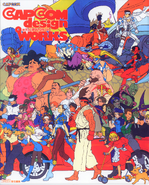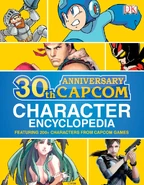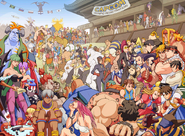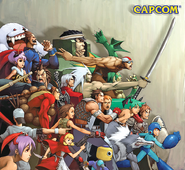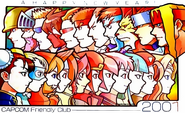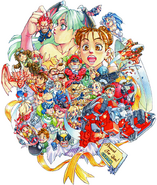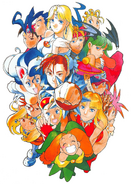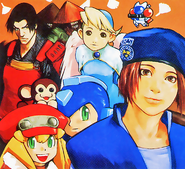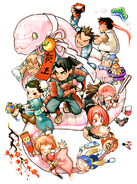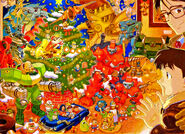Tag: sourceedit |
(Editing a gallery) |
||
| (43 intermediate revisions by 12 users not shown) | |||
| Line 1: | Line 1: | ||
| − | [[Image:CapcomLogo2.png|center|300px]] |
+ | [[Image:CapcomLogo2.png|center|300px|Capcom's original logo]] |
| + | {{nihongo|'''Capcom Co., Ltd.'''|株式会社カプコン|Kabushiki-gaisha Kapukon|lead=yes}} is a Japanese video game developer and publisher<ref name="companyinfo">http://www.capcom.co.jp/ir/english/company/info.html</ref> known for creating numerous multi-million selling game franchises, including ''[[Street Fighter (series)|Street Fighter]]'', ''[[Mega Man (series)|Mega Man]]'', ''[[Resident Evil (series)|Resident Evil]]'', ''[[Devil May Cry (series)|Devil May Cry]]'', ''[[Onimusha (series)|Onimusha]]'', ''[[Ace Attorney (series)|Ace Attorney]]'', ''[[Monster Hunter (series)|Monster Hunter]]'', and ''[[Dead Rising (series)|Dead Rising]]'', as well as licensed games based on [[Versus (series)|crossovers]], or properties such as [[w:c:marvel:Marvel Comics|Marvel]] or [[w:c:disney:The Walt Disney Company|Disney]]. Established in 1979,<ref name="history">http://www.capcom.co.jp/ir/english/company/history.html</ref> it has become an international enterprise with subsidiaries in North America, Europe, and East Asia.<ref name="capcomgroup">http://www.capcom.co.jp/ir/english/company/address.html</ref> |
||
| − | '''Capcom Co., Ltd.'''(株式会社カプコン) is a leading Japanese international developer and publisher of video games headquartered in [[Wikipedia:Osaka|Osaka]], [[Wikipedia:Japan|Japan]]. It was founded in 1979 as '''Japan Capsule Computers''', a company devoted to the manufacturing and distribution of electronic game machines. |
||
| + | ==History== |
||
| − | According to Capcom (カプコン), the name "CAPCOM" is an abbreviation of CAPsule COMputer. This was a phrase symbolic of an internal company objective to create a new gaming experience that would exceed that of rival personal computers, which had also been increasing in popularity during the same period. The word capsule alludes to how Capcom likened its game software to "a capsule packed to the brim with gaming fun", as well as to the company's desire to protect its intellectual property with a hard outer shell, preventing illegal copies and inferior imitations. |
||
| + | Capcom's predecessor, I.R.M Corporation, was founded on May 30, 1979<ref name="ign25th">http://pc.ign.com/articles/881/881137p1.html</ref> by [[Kenzo Tsujimoto]]. Tsujimoto was still president of [[wikipedia:Irem|Irem Corporation]] when he founded I.R.M. Tsujimoto worked concomitantly in both companies until leaving the former in 1983. |
||
| + | The original companies that spawned Capcom's Japanese branch were I.R.M as well as its subsidiary Japan Capsule Computers Co., Ltd., both of which were devoted to the manufacturing and distribution of electronic game machines.<ref name="history" /> The two companies underwent a name change to Sambi Co., Ltd. in September 1981,<ref name="history" /> while Capcom Co., Ltd. was first established on June 11, 1983 by Kenzo Tsujimoto,<ref name="ign25th" /> for the purpose of taking over the internal sales department.<ref>http://www.capcom.co.jp/ir/company/history.html</ref> |
||
| − | Over the years, Capcom has created some of the biggest and longest running franchises in video gaming history since starting out in 1979. The company released their first arcade game in 1984, ''[[Vulgus]]''. Their early games were mostly arcade games such as the scrolling shooter ''[[1942]]''. |
||
| + | In January 1989, the old affiliate company Capcom Co., Ltd. merged with Sambi Co., Ltd., resulting in the current Japanese branch.<ref name="history" /> The name Capcom is a clipped compound of "'''Cap'''sule '''Com'''puters", a term coined by the company to describe the arcade machines it solely manufactured in its early years, designed to set themselves apart from personal computers that were becoming widespread at that time.<ref name="name">http://www.capcom.co.jp/ir/company/name.html</ref> The word capsule alludes to how Capcom likened its game software to "a capsule packed to the brim with gaming fun", as well as to the company's desire to protect its intellectual property with a hard outer shell, preventing illegal copies and inferior imitations.<ref name="name" /> |
||
| − | In the late 1980s, Yoshiki Okamoto joined the company from '''Konami'''. In 1987, Capcom released the game ''[[Street Fighter]]''. Also in 1987, the company released the platformer ''[[Mega Man]]'' (''Rockman'' in Japan) for the Nintendo Entertainment System. |
||
| + | While Capcom's first product was the coin-operated ''[[Little League]]'' from July 1983, its first real video game, the arcade title ''[[Vulgus]]'', was released in May 1984.<ref name="history" /> Beginning with a Nintendo Entertainment System port of ''[[1942]]'' published in December 1985, the company started to venture into the market of home console video games,<ref name="history" /> which became its main business segment a few years later.<ref name="businesssegments" /> Its division Capcom USA had a brief stint in the late 1980s as a video game publisher for the Commodore 64 and IBM PC DOS computers although the development of these arcade ports were handled by other companies. Capcom has to date created 15 multi-million-selling game series, the most successful of which is ''[[Resident Evil (series)|Resident Evil]]''.<ref name="salesdata">https://web.archive.org/web/20140327174103/http://www.capcom.co.jp/ir/english/business/salesdata.html</ref> |
||
| − | ''[[Final Fight]]'', a beat 'em up, was released in 1989. In 1991, Okamoto's ''[[Street Fighter II]]'' was released in the arcades. |
||
| + | Capcom has been noted as the last major publisher to be committed to 2D games, though this was not entirely by choice. The company's commitment to the Super Nintendo Entertainment System as its platform of choice caused them to lag behind other leading publishers in developing 3D-capable arcade boards.<ref name="NGen17">cite magazine|title=Capcom |magazine=[[wikipedia:Next Generation (magazine)|Next Generation]]|issue=17|publisher=[[wikipedia:Imagine Media|Imagine Media]]|date=May 1996|pages=67–69</ref> In addition, the 2D animated cartoon-style graphics seen in games such as ''[[Darkstalkers: The Night Warriors]]'' and ''[[X-Men: Children of the Atom]]'' proved popular, leading Capcom to adopt it as a signature style and use it in more games.<ref name="NGen17"/> |
||
| − | ''[[Breath of Fire]]'', Capcom's first major foray into the RPG genre, was released in 1994 for the Super Nintendo Entertainment System. |
||
| + | In 1994, Capcom adapted its ''[[Street Fighter (series)|Street Fighter]]'' series of fighting games into [[w:c:streetfighter:Street Fighter (1994 film)|a film of the same name]]. While commercially successful, it was critically panned. [[w:c:residentevil:Resident Evil (film)|A 2002 adaptation of its ''Resident Evil'']] series faced similar criticism but was also successful in theaters. The company sees films as a way to build sales for its video games.<ref name="Gaudiosi">Gaudiosi, John. "Capcom Seeks More Playtime in HWood." Hollywood Reporter 397 (2006): 4,4,29. ProQuest Research Library. Web. 30 May 2012.</ref> |
||
| − | ''[[Resident Evil]]'' (''Biohazard'' in Japan), a successful survival horror game, was released on the PlayStation in 1996. |
||
| + | Capcom partnered with [[wikipedia:Nyu Media|Nyu Media]] in 2011 to publish and distribute the Japanese independent (dōjin soft) games that Nyu localized into the English language.<ref name="IG: 2011-12"/> The company works with the Polish localization company [[QLoc]] to port Capcom's games to other platforms,<ref>http://www.egmnow.com/articles/news/dustforce-sweeping-onto-xbox-live-arcade-and-psn-for-ps3-vita-january-2014/</ref> notably examples are ''[[DmC: Devil May Cry]]''<nowiki>'</nowiki>s PC version and its PlayStation 4 and Xbox One remasters, ''[[Dragon's Dogma]]''<nowiki>'</nowiki>s PC version released in January 2016, and ''[[Dead Rising]]''<nowiki>'</nowiki>s version on PlayStation 4, Xbox One and PC released on September 13, 2016. |
||
| − | Two Capcom development houses, the now-defunct Clover Studio and Flagship have created successful titles in recent years, including the ''[[Viewtiful Joe Series|Viewtiful Joe]]'' series and ''[[Okami]]''. |
||
| + | In August 27, 2014, Capcom filed a patent infringement lawsuit against [[wikipedia:Koei Tecmo Games|Koei Tecmo Games]] at the Osaka District Court for 980 million yen in damage. Capcom claimed Koei Tecmo Games infringed a patent it obtained in 2002 regarding a play feature in video games.<ref name="Koei Tecmo Games">http://www.eurogamer.net/articles/2014-08-26-capcom-files-lawsuit-against-koei-tecmo-for-patent-infringement</ref> |
||
| − | In 2002, a movie based on the series entitled ''Resident Evil'' was released, which did well enough financially to warrant a sequel (''Resident Evil: Apocalypse'') in 2004. A third movie, ''Resident Evil: Extinction'' was released on September 21, 2007, and led the box office in first place. |
||
| + | During their quarterly earnings call in August 2018, Capcom expressed an interest to explore the possibility of additional remakes and re-releases of their earlier IPs.<ref>http://www.capcom.co.jp/ir/english/data/pdf/explanation/2018/1st/explanation_2018_1st_02.pdf</ref><ref>https://www.videogamer.com/news/capcom-says-it-will-explore-the-possibility-of-more-remakes-and-re-releases</ref> |
||
| − | Capcom also teamed up with Microsoft to make the successful ''[[Dead Rising]]'' in 2006, which was a popular zombie survival and adventure game exclusively for the Xbox 360 and spawned two sequels. |
||
| + | On April 2nd, 2020, an employee had contracted the [[wikipedia:Coronavirus|coronavirus]] (COVID-19) at Capcom's headquarters in Chuo-ku, Osaka. Capcom promised to work with health authorities to try and prevent any further spread.<ref>http://www.capcom.co.jp/ir/news/html/200402.html</ref><ref>https://twitter.com/japaneseswitch/status/1245687009584218113</ref> |
||
| − | Beside developing games under its own brand, Capcom also developed the arcade, Dreamcast and PS2 versions of its ''Mobile Suit Gundam'' third person shoot-em-ups for Banpresto and also distribute many games including the ''Grand Theft Auto'' series for the Japanese market. |
||
| + | ==Corporate structure== |
||
| − | Suleputer (セルピュータ) is the name the Japanese game development company Capcom uses for its audio releases, such as soundtracks, etc. Its name is derived from the second half of the full name of CAPCOM: CapSULE ComPUTER. |
||
| + | ===Development studios=== |
||
| − | As of mid-2007, Capcom teamed up with Valve Corporation to release games through Valve's Steam content delivery system, being the first Japanese company to do so. There are many games available, those being ''[[Devil May Cry 3: Dante's Awakening|Devil May Cry 3 Special Edition]]'', ''[[Lost Planet: Extreme Condition|Lost Planet]]'', ''[[Dark Void]]'', ''[[Resident Evil 5]]'', ''[[Street Fighter IV]]'' and ''[[Dead Rising 2]]''. |
||
| + | In the first few years after its establishment, the Japanese branch of Capcom had three development groups referred to as "Planning Rooms", led by [[Tokuro Fujiwara]], Takashi Nishiyama and [[Yoshiki Okamoto]], respectively.<ref>cite journal |journal=Gameside |script-title=ja:ゲーム業界を"爆発"させた"ストライダー"の父 「四井浩一」 ディスコグラフィー |date=February 2009 |issue=16 |language=Japanese |publisher=Micro Magazine</ref><ref>cite video game |title=[[Strider (classic version)|Strider Hiryū]] |developer=Capcom Co., Ltd |publisher=Capcom Co., Ltd. |date=March 7, 1989 |scene=staff credits</ref> Later, games developed internally used to be created by several numbered "Production Studios", each assigned to different games.<ref>http://psp.ign.com/articles/775/775450p1.html</ref><ref name="annualreport2009" /> Starting in 2002, the development process was reformed to better share technologies and expertise, and all of the individual studios were gradually restructured into bigger departments responsible for different tasks.<ref name="annualreport2009" /> While there are self-contained departments for the creation of arcade, pachinko and pachislo, online, and mobile games, the Consumer Games R&D Division instead is an amalgamation of subsections in charge of various game development stages.<ref name="annualreport2009" /><ref>http://www.capcom.co.jp/ir/english/interview/2008/</ref><ref name="annualreport2007">http://www.capcom.co.jp/ir/english/data/pdf/2007annual/Annual2007e.pdf</ref> |
||
| + | Capcom has three internal divisions to make games. Those are Consumer games division 1 with ''[[Resident Evil (series)|Resident Evil]]'' and ''[[Devil May Cry (series)|Devil May Cry]]'' focusing on worldwide franchises, Consumer games division 2 with ''[[Street Fighter (series)|Street Fighter]]'', ''[[Marvel vs. Capcom (series)|Marvel vs. Capcom]]'' and other online focused games and Consumer games division 3 with ''[[Ace Attorney (series)|Ace Attorney]]'', ''[[Monster Hunter (series)|Monster Hunter]]'' and ''[[Sengoku BASARA (series)|Sengoku Basara]]'' with more traditional IP.<ref>http://www.gamesindustry.biz/articles/2015-10-13-capcoms-resident-evil-division-focusing-on-vr?utm_source=newsletter&utm_medium=email&utm_campaign=european-daily</ref> |
||
| − | Capcom develops products for all age groups, and supports the programs and guidelines established by the Entertainment Software Rating Board (ESRB). Capcom's "E" rated games for Everyone (content suitable for persons 6 and older) include the ''[[Mega Man Series|Mega Man]]'' franchise of games. Capcom's "T" rated games for Teens (content suitable for persons 13 and older) include the ''[[Street Fighter Series|Street Fighter]]'', ''[[Breath of Fire Series|Breath of Fire]]'' and ''[[Darkstalkers Series|Darkstalkers]]'' franchise of products. Capcom's "M" rated games for mature audiences (content suitable for persons 17 and older) include the ''[[Resident Evil Series|Resident Evil]]'', ''[[Devil May Cry Series|Devil May Cry]]'' and ''[[Onimusha Series|Onimusha]]'' series of products. |
||
| + | |||
| + | In addition to these internal teams, Capcom also commissions outside development studios to ensure a steady output of titles.<ref>https://web.archive.org/web/20100407010514/http://www.capcom.co.jp/ir/english/interview/2009/vol08/index.html</ref><ref>http://www.capcom.co.jp/ir/english/interview/2010/vol01/03.html</ref> However, following poor sales of ''[[Dark Void]]'' and ''[[Bionic Commando]]'', the company's management has decided to limit outsourcing to sequels and newer versions of installments in existing franchises, reserving the development of original titles for its in-house teams.<ref>http://kotaku.com/5540859/bionic-commando-dark-void-last-straws-for-capcom</ref> The production of games, budgets, and platforms supported are decided upon in development approval meetings, attended by the company management and the marketing, sales, and quality control departments.<ref name="annualreport2009" /> |
||
| + | |||
| + | ===Branches and subsidiaries=== |
||
| + | Apart from the head office building and the R&D building of Capcom Co., Ltd., both located in Chūō-ku, Osaka,<ref name="capcomgroup" /> the Japanese parent company also has a branch office in the Shinjuku Mitsui Building in Nishi-Shinjuku, Shinjuku, Tokyo.<ref name="Osakatokyo">"[http://www.capcom.co.jp/ir/english/company/map.html Locations]|webarchive|url=https://web.archive.org/web/20111007130308/http://www.capcom.co.jp/ir/english/company/map.html |date=October 7, 2011 ." Capcom. Retrieved on August 12, 2011. "3-1-3 Uchihirano-machi, Chuo-ku, Osaka |
||
| + | 540-0037, Japan" and "Shinjuku Mitsui Building 2-1-1 Nishi Shinjuku, Shinjuku-ku, Tokyo"</ref> It also has the Ueno Facility, a branch office in Iga, Mie Prefecture.<ref name="capcomgroup" /> |
||
| + | |||
| + | The international Capcom Group encompasses 15 subsidiaries in Japan, North America, Europe, and East Asia.<ref name="capcomgroup" /><ref name="annualreport2009">http://www.capcom.co.jp/ir/english/data/pdf/2009annual/e2009annual.pdf</ref> Affiliated companies include Koko Capcom Co., Ltd. in South Korea, Street Fighter Film, LLC in the United States, and Dellgamadas Co., Ltd.<ref name="annualreport2009" /> |
||
| + | |||
| + | ===Game-related media=== |
||
| + | In addition to the development and publishing of home, online, mobile, arcade, pachinko, and pachislot games, the company publishes strategy guides,<ref name="history" /> maintains its own arcade centers in Japan known as ''Plaza Capcom'', and licenses its franchise and character properties for use in tie-in products, movies, television series, and stage performances.<ref name="businesssegments">http://www.capcom.co.jp/ir/english/company/business.html</ref> |
||
| + | |||
| + | [[Suleputer]], an in-house marketing and music label established in cooperation with [[wikipedia:Sony Music Entertainment Japan|Sony Music Entertainment Intermedia]] in 1998, publishes CDs, DVDs, and other media based on Capcom's games.<ref name="annualreport1998">http://www.capcom.co.jp/ir/english/data/pdf/Annual1998.pdf</ref> An annual private media summit called Captivate, renamed from Gamers Day in 2008, is traditionally used as a platform for new game and business announcements.<ref>http://www.capcom-unity.com/kramez/blog/2008/03/28/gamers_day_is_dead_long_live_the_captivate08_media</ref> |
||
| + | |||
| + | ==Criticism and controversy== |
||
| + | In 2012, Capcom was criticized for controversial sales tactics, such as having to pay for additional content which is already available within the game's files, most notably in ''[[Street Fighter X Tekken]]''. Capcom has defended the practice.<ref>https://web.archive.org/web/20120404121921/http://www.gamespot.com/news/capcom-defends-on-disc-dlc-report-6369371</ref> The company has been criticized for other business decisions, such as not releasing certain games outside Japan (most notably the ''[[Sengoku Basara (series)|Sengoku BASARA]]'' series), abruptly cancelling anticipated projects (most notably ''[[Mega Man Legends 3]]''), and shutting down [[Clover Studio]]. In 2015, the company pulled the PlayStation 4 version of ''[[Ultra Street Fighter IV]]'' from the [[Capcom Pro Tour]] due to numerous technical issues and gameplay bugs.<ref>http://www.eurogamer.net/articles/2015-05-28-capcom-pulls-ps4-version-of-ultra-street-fighter-4-from-its-own-tournament</ref> In 2016, Capcom released ''[[Street Fighter V]]'' with very limited single player content. At launch, there were stability issues with the game's network that booted players mid-game even when they were not playing in an online mode.<ref>https://www.gamespot.com/articles/capcom-responds-to-street-fighter-5s-lack-of-conte/1100-6438601/</ref> ''Street Fighter V'' failed to meet its sales target of 2 million in March 2016.<ref>https://gamerant.com/street-fighter-5-capcom-sales-target-382/</ref> |
||
==Subsidiaries== |
==Subsidiaries== |
||
*'''Capcom Entertainment, Inc.''' |
*'''Capcom Entertainment, Inc.''' |
||
| + | |||
*'''Capcom U.S.A., Inc.''' was established in California as the official North American subsidiary of Capcom in August 1985. |
*'''Capcom U.S.A., Inc.''' was established in California as the official North American subsidiary of Capcom in August 1985. |
||
| + | |||
*'''Capcom Studio 8, Inc.''' was established as the R&D division of Capcom USA, Inc. in June 1995. The studio was closed in 2006. |
*'''Capcom Studio 8, Inc.''' was established as the R&D division of Capcom USA, Inc. in June 1995. The studio was closed in 2006. |
||
| + | |||
*'''Capcom Asia Co., Ltd.''' was established in Hong Kong as the official Asian subsidiary of Capcom in July 1993. |
*'''Capcom Asia Co., Ltd.''' was established in Hong Kong as the official Asian subsidiary of Capcom in July 1993. |
||
| + | |||
*'''Capcom Eurosoft Ltd.''' was established in United Kingdom as the official European subsidiary of Capcom in July 1998. |
*'''Capcom Eurosoft Ltd.''' was established in United Kingdom as the official European subsidiary of Capcom in July 1998. |
||
| + | |||
*'''KOKO Capcom Asia Co., Ltd.''' is the official South Korean subsidiary of Capcom, established in July 2001. |
*'''KOKO Capcom Asia Co., Ltd.''' is the official South Korean subsidiary of Capcom, established in July 2001. |
||
| + | |||
| − | *'''Suleputer''' was established to market and distribute games and related merchandising (books, music, anime, etc.) in Asia. Their current name is a conjunction of CapSULE ComPUTER. |
+ | *'''[[Suleputer]]''' was established to market and distribute games and related merchandising (books, music, anime, etc.) in Asia. Their current name is a conjunction of CapSULE ComPUTER. |
| + | |||
*'''Captron Co., Ltd.''' manages the rent, lease and operation of real estate properties. |
*'''Captron Co., Ltd.''' manages the rent, lease and operation of real estate properties. |
||
| + | |||
*'''Flagship Co., Ltd.''' is the development studio that made ''[[Onimusha Tactics]]'' and the ''Zelda'' games on the Game Boy Color and Game Boy Advance, most recently releasing ''[[The Legend of Zelda: The Minish Cap]]''. |
*'''Flagship Co., Ltd.''' is the development studio that made ''[[Onimusha Tactics]]'' and the ''Zelda'' games on the Game Boy Color and Game Boy Advance, most recently releasing ''[[The Legend of Zelda: The Minish Cap]]''. |
||
| + | |||
*'''Capcom Charbo Co., Ltd.''' manages the rental, maintenance and lease of electronic game machines. |
*'''Capcom Charbo Co., Ltd.''' manages the rental, maintenance and lease of electronic game machines. |
||
| + | |||
*'''CE Europe Ltd.''' was established in London in November 2002. |
*'''CE Europe Ltd.''' was established in London in November 2002. |
||
| + | |||
*'''CEG Interactive Entertainment GmbH''' was established in Germany in February 2003. |
*'''CEG Interactive Entertainment GmbH''' was established in Germany in February 2003. |
||
| + | |||
| − | *'''Nude Maker Co., Ltd.''' is the development studio that made ''Clock Tower 1, 2'' games on the PlayStation and Xbox and ''Steel Battalion'' only in Xbox.. |
||
| − | *''' |
+ | *'''Nude Maker Co., Ltd.''' is the development studio that made ''Clock Tower 1'' and ''2'' games on the PlayStation and Xbox and ''Steel Battalion'' only in Xbox. |
| + | |||
| + | *'''[[Clover Studio|Clover Studio Co., Ltd.]]''' was a development studio based in Osaka. It was founded in July 2004, and was dissolved in March 2007. They created the ''[[Viewtiful Joe Series|Viewtiful Joe]]'' series, as well as ''[[Okami]]'' and ''[[God Hand]]''. Later merged with another company to form Platinum Games. |
||
| + | |||
*'''Nickel City''' is a chain of video arcades once owned by Capcom where the machines ran on nickels or for free. It was sold in 2004 and continues to operate under independent ownership. |
*'''Nickel City''' is a chain of video arcades once owned by Capcom where the machines ran on nickels or for free. It was sold in 2004 and continues to operate under independent ownership. |
||
| + | |||
*'''Capcom Interactive Canada''' is a division of Capcom and their focus is developing games for mobile platforms. |
*'''Capcom Interactive Canada''' is a division of Capcom and their focus is developing games for mobile platforms. |
||
| − | *'''Capcom Vancouver''' formerly Blue Castle Games, the company was acquired by Capcom after the release of ''[[Dead Rising 2]]''. |
||
| + | *'''[[Capcom Vancouver]]''', formerly '''Blue Castle Games''', the company was acquired by Capcom after the release of ''[[Dead Rising 2]]''. They were at one point working with [[wikipedia:Epic Games|Epic Games]] to utilize the latter's [[wikipedia:Unreal Engine 4|Unreal Engine 4]] for several projects.<ref>http://www.capcom-unity.com/capkel/blog/2016/01/13/capcom-vancouver-is-hiring---unreal-engine-4-being-used-for-upcoming-projects</ref> The company also aided in support for ''[[Puzzle Fighter]]''. The company was officialy shut down in September 2018.<ref>https://www.gamesindustry.biz/articles/2018-09-18-capcom-took-a-usd40-million-loss-on-cancelled-vancouver-projects</ref> |
||
| ⚫ | |||
| ⚫ | *According to the |
||
| + | *'''[[QLoc]]''' is Capcom's localization team. |
||
| − | *Although their newer games tend to be more realistic, Capcom was visually known for their trademark, anime/cartoonish style. |
||
| + | |||
| + | *'''Capcom Mobile''' focus on creating hit mobile titles in both Japan, as well as the rest of the world. The company hopes to do this by leveraging their most popular IPs, with a particular focus of utilizing licensed content in Asia. This subdivision will integrate both Capcom brands and the Capcom-owned Beeline Interactive, which allows for quicker decisions and publishing of games that use Capcom IPs, worldwide. |
||
| + | |||
| + | ==Websites== |
||
| + | *'''Capcom-Unity''' - Capcom's official English community site. |
||
| + | |||
| + | *'''E-Capcom''' - Capcom of Japan's official goods shop site. |
||
| + | |||
| + | *'''Capcom Fighters Network''' - Capcom's website mainly dedicated to ''[[Street Fighter V (series)|Street Fighter V]]'' as well as the [[Street Fighter series|''Street Fighter'' franchise]] in general. |
||
| + | **'''Shadaloo Combat Research Institute''' (シャドルー格闘家研究所 Shadorū Kakutō-ka Kenkyūjo?, "Shadaloo Fighter Institute") - Also referred to as the '''Shadaloo C.R.I.''' (シャド研 Shadoken?) for short, it is a section of the Capcom Fighters Network website dedicated to ''Street Fighter V'', featuring extra content related to the game. The site is presented as if it were a database used by members of [[Shadaloo]], with each of the posts being authored by different Shadaloo soldiers. In addition, the site features "Activity Reports", columns which cover various topics (such as profiles, unused stages and characters, concept art, and interviews). The art in the profiles and most key art in "Activity Reports" are done by KIKI, one of ''Street Fighter V''<nowiki>'</nowiki>s lead artists. |
||
| + | |||
| + | *'''Capcom Online Games''' - Capcom's Japanese site for online games. |
||
| + | |||
| + | ==Events== |
||
| + | {{Incomplete section}} |
||
| + | |||
| + | *'''[[Capcom Cup]]''' |
||
| + | |||
| + | *'''Capcom Pro Tour''' |
||
| + | |||
| + | ==Media and merchandise== |
||
| + | |||
| + | ===Publications=== |
||
| + | *'''[[All About]]''' |
||
| + | |||
| + | *'''[[Capcom Gamebooks]]''' |
||
| + | |||
| + | *'''[[Secret Files]]''' |
||
| + | |||
| + | ====Magazines==== |
||
| + | *'''[[Cap-Bon!]]''' |
||
| + | |||
| + | *'''[[CFC Style Fan-Book CAP!]]''' |
||
| + | |||
| + | *'''[[Club Capcom]]''' |
||
| + | |||
| + | ==See also== |
||
| + | *[[Capcom Play System]] |
||
| + | |||
| + | *[[MT Framework]] |
||
| + | |||
| + | *[[Panta Rhei]] |
||
| + | |||
| + | *[[Capcom Five]] |
||
| + | |||
| + | *[[RE Engine]] |
||
| + | |||
| + | ===Companies=== |
||
| + | {|class="wikitable" |
||
| + | |- |
||
| + | !Name |
||
| + | !Foundation |
||
| + | !Affiliation |
||
| + | |- |
||
| + | |[[Arika]] |
||
| + | |1 November, 1995 |
||
| + | |Founded by [[Akira Nishitani]] as ARMtech. |
||
| + | |- |
||
| + | |[[wikipedia:Crafts & Meister|Crafts & Meister]] |
||
| + | |1 June, 2004 |
||
| + | |Founded by [[Noritaka Funamizu]] and [[Katsuhiro Sudo]]. |
||
| + | |- |
||
| + | |[[wikipedia:Game Republic|Game Republic]] |
||
| + | |1 July, 2003 |
||
| + | |Founded by [[Yoshiki Okamoto]]. |
||
| + | |- |
||
| + | |[[Inti Creates]] |
||
| + | |8 May, 1996 |
||
| + | |Founded by [[Takuya Aizu]]. |
||
| + | |- |
||
| + | |[[wikipedia:Level-5 Comcept|Level-5 Comcept]] |
||
| + | |1 December, 2010 |
||
| + | |Founded by [[Keiji Inafune]] as Comcept. |
||
| + | |- |
||
| + | |[[wikipedia:PlatinumGames|PlatinumGames]] |
||
| + | |1 October, 2007 |
||
| + | |Founded by [[Shinji Mikami]], [[Atsushi Inaba]], [[Hideki Kamiya]] and Tatsuya Minami. |
||
| + | |- |
||
| + | |[[wikipedia:Tango Gameworks|Tango Gameworks]] |
||
| + | |1 March, 2010 |
||
| + | |Founded by Shinji Mikami. |
||
| + | |- |
||
| + | |[[wikipedia:UTV Ignition Games|UTV Ignition Games]] |
||
| + | |26 September, 2001 |
||
| + | |Takeyasu Sawaki joined Ignition Tokyo, a subsidiary of UTV Ignition Games. |
||
| + | |} |
||
| + | |||
| ⚫ | |||
| ⚫ | *According to the "Universal Videogame List", the company's maximum output, in terms of games they developed or produced, was in 2000 with 49 games that year.<ref>http://www.uvlist.net/companies/info/15-Capcom+Capcom+Entertainment</ref> Also, maybe not surprisingly, out of the large number of games they released, most of them were [[:Category:Fighting Games|fighting games]]. |
||
== Gallery == |
== Gallery == |
||
| − | === |
+ | ===Artbooks=== |
<gallery> |
<gallery> |
||
| − | Image:Capcom Design Works Early Days.png|Design Works - Early Days |
+ | Image:Capcom Design Works Early Days.png|Capcom Design Works - Early Days |
| − | + | Capcom DWCover.png|Capcom Design Works |
|
| + | Character Encyclopedia.png|Capcom 30th Anniversary Character Encyclopedia |
||
| + | Image:Capcom Visual Works 2004-2014.png|Capcom Visual Works 2004 - 2014 |
||
</gallery> |
</gallery> |
||
| − | === |
+ | ===Miscellaneous=== |
<gallery> |
<gallery> |
||
| + | ArtOfCapcom2Vedder.png|''Art of Capcom 2'' art |
||
| + | DoeGroup.png|Capcom group artwork |
||
Capcom Happy New Year 2001.png|New Year card "2001" |
Capcom Happy New Year 2001.png|New Year card "2001" |
||
DesignWorksEarlyDaysArt.png|''Design Works'' art |
DesignWorksEarlyDaysArt.png|''Design Works'' art |
||
| + | CapGirlsGroup.png|Capcom female group artwork |
||
Capcom Famitsu Group.png|Group shot for ''[[Wikipedia:Famitsu|Famitsu]]'' |
Capcom Famitsu Group.png|Group shot for ''[[Wikipedia:Famitsu|Famitsu]]'' |
||
| − | CapGroup2.png|Capcom group |
+ | CapGroup2.png|Capcom group artwork |
| + | File:Capcom Christmas Ad.jpg|Christmas ad |
||
</gallery> |
</gallery> |
||
| + | |||
| + | ==References== |
||
| + | <references /> |
||
== External Links == |
== External Links == |
||
| Line 72: | Line 201: | ||
* [http://www.capcom.co.jp/ Capcom World Japan] - Capcom Japan's official site. |
* [http://www.capcom.co.jp/ Capcom World Japan] - Capcom Japan's official site. |
||
| − | * [http:// |
+ | * [http://www.e-capcom.com/ec/cmShopTopPage.html E-Capcom] - Capcom Japan's online shop. |
| − | * [http://www.capcom |
+ | * [http://www.capcom.com/us/ Capcom US] - Capcom USA's official site. |
| + | * [https://store.capcom.com Capcom Shop] - Also known as "The Capcom Store", official shop site. |
||
| ⚫ | |||
| + | |||
| + | * [http://www.capcom-europe.com/ Capcom Europe] - Capcom Europe's official site. |
||
| + | |||
| ⚫ | |||
* [http://www.capcomkorea.com/ Capcom World Korea] |
* [http://www.capcomkorea.com/ Capcom World Korea] |
||
| Line 82: | Line 215: | ||
* [http://www.capcom-unity.com/ Capcom-Unity] - Capcom's official community site. |
* [http://www.capcom-unity.com/ Capcom-Unity] - Capcom's official community site. |
||
| + | * [http://www.capcom-onlinegames.jp/pc/ Capcom Online Games] |
||
| ⚫ | |||
* [http://www.capcom.co.jp/ir/english/company/history.html Official Company History] |
* [http://www.capcom.co.jp/ir/english/company/history.html Official Company History] |
||
| + | * [http://game.capcom.com/cfn/sfv/index.html Capcom Fighters Network site] (available on both Japanese and English) |
||
| − | * [http://suleputer.capcom.co.jp/suleputer/ SULEPUTER] |
||
| + | |||
| ⚫ | |||
| + | * [[wikipedia:Capcom Vancouver|Wikipedia article of Capcom Vancouver]] |
||
| − | * [http://capcom-unity.com/go/suggestion/box Official Suggestion Box] (No longer available) |
||
| − | * [http://www.the-nextlevel.com/features/developers/production-studio-4/history.shtml Production Studio 4 |
+ | * [http://www.the-nextlevel.com/features/developers/production-studio-4/history.shtml Production Studio 4 history article] |
[[Category:Companies]] |
[[Category:Companies]] |
||
Revision as of 22:09, 23 April 2020
Capcom Co., Ltd. (株式会社カプコン Kabushiki-gaisha Kapukon) is a Japanese video game developer and publisher[1] known for creating numerous multi-million selling game franchises, including Street Fighter, Mega Man, Resident Evil, Devil May Cry, Onimusha, Ace Attorney, Monster Hunter, and Dead Rising, as well as licensed games based on crossovers, or properties such as Marvel or Disney. Established in 1979,[2] it has become an international enterprise with subsidiaries in North America, Europe, and East Asia.[3]
History
Capcom's predecessor, I.R.M Corporation, was founded on May 30, 1979[4] by Kenzo Tsujimoto. Tsujimoto was still president of Irem Corporation when he founded I.R.M. Tsujimoto worked concomitantly in both companies until leaving the former in 1983.
The original companies that spawned Capcom's Japanese branch were I.R.M as well as its subsidiary Japan Capsule Computers Co., Ltd., both of which were devoted to the manufacturing and distribution of electronic game machines.[2] The two companies underwent a name change to Sambi Co., Ltd. in September 1981,[2] while Capcom Co., Ltd. was first established on June 11, 1983 by Kenzo Tsujimoto,[4] for the purpose of taking over the internal sales department.[5]
In January 1989, the old affiliate company Capcom Co., Ltd. merged with Sambi Co., Ltd., resulting in the current Japanese branch.[2] The name Capcom is a clipped compound of "Capsule Computers", a term coined by the company to describe the arcade machines it solely manufactured in its early years, designed to set themselves apart from personal computers that were becoming widespread at that time.[6] The word capsule alludes to how Capcom likened its game software to "a capsule packed to the brim with gaming fun", as well as to the company's desire to protect its intellectual property with a hard outer shell, preventing illegal copies and inferior imitations.[6]
While Capcom's first product was the coin-operated Little League from July 1983, its first real video game, the arcade title Vulgus, was released in May 1984.[2] Beginning with a Nintendo Entertainment System port of 1942 published in December 1985, the company started to venture into the market of home console video games,[2] which became its main business segment a few years later.[7] Its division Capcom USA had a brief stint in the late 1980s as a video game publisher for the Commodore 64 and IBM PC DOS computers although the development of these arcade ports were handled by other companies. Capcom has to date created 15 multi-million-selling game series, the most successful of which is Resident Evil.[8]
Capcom has been noted as the last major publisher to be committed to 2D games, though this was not entirely by choice. The company's commitment to the Super Nintendo Entertainment System as its platform of choice caused them to lag behind other leading publishers in developing 3D-capable arcade boards.[9] In addition, the 2D animated cartoon-style graphics seen in games such as Darkstalkers: The Night Warriors and X-Men: Children of the Atom proved popular, leading Capcom to adopt it as a signature style and use it in more games.[9]
In 1994, Capcom adapted its Street Fighter series of fighting games into a film of the same name. While commercially successful, it was critically panned. A 2002 adaptation of its Resident Evil series faced similar criticism but was also successful in theaters. The company sees films as a way to build sales for its video games.[10]
Capcom partnered with Nyu Media in 2011 to publish and distribute the Japanese independent (dōjin soft) games that Nyu localized into the English language.[11] The company works with the Polish localization company QLoc to port Capcom's games to other platforms,[12] notably examples are DmC: Devil May Cry's PC version and its PlayStation 4 and Xbox One remasters, Dragon's Dogma's PC version released in January 2016, and Dead Rising's version on PlayStation 4, Xbox One and PC released on September 13, 2016.
In August 27, 2014, Capcom filed a patent infringement lawsuit against Koei Tecmo Games at the Osaka District Court for 980 million yen in damage. Capcom claimed Koei Tecmo Games infringed a patent it obtained in 2002 regarding a play feature in video games.[13]
During their quarterly earnings call in August 2018, Capcom expressed an interest to explore the possibility of additional remakes and re-releases of their earlier IPs.[14][15]
On April 2nd, 2020, an employee had contracted the coronavirus (COVID-19) at Capcom's headquarters in Chuo-ku, Osaka. Capcom promised to work with health authorities to try and prevent any further spread.[16][17]
Corporate structure
Development studios
In the first few years after its establishment, the Japanese branch of Capcom had three development groups referred to as "Planning Rooms", led by Tokuro Fujiwara, Takashi Nishiyama and Yoshiki Okamoto, respectively.[18][19] Later, games developed internally used to be created by several numbered "Production Studios", each assigned to different games.[20][21] Starting in 2002, the development process was reformed to better share technologies and expertise, and all of the individual studios were gradually restructured into bigger departments responsible for different tasks.[21] While there are self-contained departments for the creation of arcade, pachinko and pachislo, online, and mobile games, the Consumer Games R&D Division instead is an amalgamation of subsections in charge of various game development stages.[21][22][23]
Capcom has three internal divisions to make games. Those are Consumer games division 1 with Resident Evil and Devil May Cry focusing on worldwide franchises, Consumer games division 2 with Street Fighter, Marvel vs. Capcom and other online focused games and Consumer games division 3 with Ace Attorney, Monster Hunter and Sengoku Basara with more traditional IP.[24]
In addition to these internal teams, Capcom also commissions outside development studios to ensure a steady output of titles.[25][26] However, following poor sales of Dark Void and Bionic Commando, the company's management has decided to limit outsourcing to sequels and newer versions of installments in existing franchises, reserving the development of original titles for its in-house teams.[27] The production of games, budgets, and platforms supported are decided upon in development approval meetings, attended by the company management and the marketing, sales, and quality control departments.[21]
Branches and subsidiaries
Apart from the head office building and the R&D building of Capcom Co., Ltd., both located in Chūō-ku, Osaka,[3] the Japanese parent company also has a branch office in the Shinjuku Mitsui Building in Nishi-Shinjuku, Shinjuku, Tokyo.[28] It also has the Ueno Facility, a branch office in Iga, Mie Prefecture.[3]
The international Capcom Group encompasses 15 subsidiaries in Japan, North America, Europe, and East Asia.[3][21] Affiliated companies include Koko Capcom Co., Ltd. in South Korea, Street Fighter Film, LLC in the United States, and Dellgamadas Co., Ltd.[21]
In addition to the development and publishing of home, online, mobile, arcade, pachinko, and pachislot games, the company publishes strategy guides,[2] maintains its own arcade centers in Japan known as Plaza Capcom, and licenses its franchise and character properties for use in tie-in products, movies, television series, and stage performances.[7]
Suleputer, an in-house marketing and music label established in cooperation with Sony Music Entertainment Intermedia in 1998, publishes CDs, DVDs, and other media based on Capcom's games.[29] An annual private media summit called Captivate, renamed from Gamers Day in 2008, is traditionally used as a platform for new game and business announcements.[30]
Criticism and controversy
In 2012, Capcom was criticized for controversial sales tactics, such as having to pay for additional content which is already available within the game's files, most notably in Street Fighter X Tekken. Capcom has defended the practice.[31] The company has been criticized for other business decisions, such as not releasing certain games outside Japan (most notably the Sengoku BASARA series), abruptly cancelling anticipated projects (most notably Mega Man Legends 3), and shutting down Clover Studio. In 2015, the company pulled the PlayStation 4 version of Ultra Street Fighter IV from the Capcom Pro Tour due to numerous technical issues and gameplay bugs.[32] In 2016, Capcom released Street Fighter V with very limited single player content. At launch, there were stability issues with the game's network that booted players mid-game even when they were not playing in an online mode.[33] Street Fighter V failed to meet its sales target of 2 million in March 2016.[34]
Subsidiaries
- Capcom Entertainment, Inc.
- Capcom U.S.A., Inc. was established in California as the official North American subsidiary of Capcom in August 1985.
- Capcom Studio 8, Inc. was established as the R&D division of Capcom USA, Inc. in June 1995. The studio was closed in 2006.
- Capcom Asia Co., Ltd. was established in Hong Kong as the official Asian subsidiary of Capcom in July 1993.
- Capcom Eurosoft Ltd. was established in United Kingdom as the official European subsidiary of Capcom in July 1998.
- KOKO Capcom Asia Co., Ltd. is the official South Korean subsidiary of Capcom, established in July 2001.
- Suleputer was established to market and distribute games and related merchandising (books, music, anime, etc.) in Asia. Their current name is a conjunction of CapSULE ComPUTER.
- Captron Co., Ltd. manages the rent, lease and operation of real estate properties.
- Flagship Co., Ltd. is the development studio that made Onimusha Tactics and the Zelda games on the Game Boy Color and Game Boy Advance, most recently releasing The Legend of Zelda: The Minish Cap.
- Capcom Charbo Co., Ltd. manages the rental, maintenance and lease of electronic game machines.
- CE Europe Ltd. was established in London in November 2002.
- CEG Interactive Entertainment GmbH was established in Germany in February 2003.
- Nude Maker Co., Ltd. is the development studio that made Clock Tower 1 and 2 games on the PlayStation and Xbox and Steel Battalion only in Xbox.
- Clover Studio Co., Ltd. was a development studio based in Osaka. It was founded in July 2004, and was dissolved in March 2007. They created the Viewtiful Joe series, as well as Okami and God Hand. Later merged with another company to form Platinum Games.
- Nickel City is a chain of video arcades once owned by Capcom where the machines ran on nickels or for free. It was sold in 2004 and continues to operate under independent ownership.
- Capcom Interactive Canada is a division of Capcom and their focus is developing games for mobile platforms.
- Capcom Vancouver, formerly Blue Castle Games, the company was acquired by Capcom after the release of Dead Rising 2. They were at one point working with Epic Games to utilize the latter's Unreal Engine 4 for several projects.[35] The company also aided in support for Puzzle Fighter. The company was officialy shut down in September 2018.[36]
- QLoc is Capcom's localization team.
- Capcom Mobile focus on creating hit mobile titles in both Japan, as well as the rest of the world. The company hopes to do this by leveraging their most popular IPs, with a particular focus of utilizing licensed content in Asia. This subdivision will integrate both Capcom brands and the Capcom-owned Beeline Interactive, which allows for quicker decisions and publishing of games that use Capcom IPs, worldwide.
Websites
- Capcom-Unity - Capcom's official English community site.
- E-Capcom - Capcom of Japan's official goods shop site.
- Capcom Fighters Network - Capcom's website mainly dedicated to Street Fighter V as well as the Street Fighter franchise in general.
- Shadaloo Combat Research Institute (シャドルー格闘家研究所 Shadorū Kakutō-ka Kenkyūjo?, "Shadaloo Fighter Institute") - Also referred to as the Shadaloo C.R.I. (シャド研 Shadoken?) for short, it is a section of the Capcom Fighters Network website dedicated to Street Fighter V, featuring extra content related to the game. The site is presented as if it were a database used by members of Shadaloo, with each of the posts being authored by different Shadaloo soldiers. In addition, the site features "Activity Reports", columns which cover various topics (such as profiles, unused stages and characters, concept art, and interviews). The art in the profiles and most key art in "Activity Reports" are done by KIKI, one of Street Fighter V's lead artists.
- Capcom Online Games - Capcom's Japanese site for online games.
Events
This section is currently incomplete.
You can help Capcom Database by expanding it.
- Capcom Pro Tour
Media and merchandise
Publications
Magazines
See also
Companies
| Name | Foundation | Affiliation |
|---|---|---|
| Arika | 1 November, 1995 | Founded by Akira Nishitani as ARMtech. |
| Crafts & Meister | 1 June, 2004 | Founded by Noritaka Funamizu and Katsuhiro Sudo. |
| Game Republic | 1 July, 2003 | Founded by Yoshiki Okamoto. |
| Inti Creates | 8 May, 1996 | Founded by Takuya Aizu. |
| Level-5 Comcept | 1 December, 2010 | Founded by Keiji Inafune as Comcept. |
| PlatinumGames | 1 October, 2007 | Founded by Shinji Mikami, Atsushi Inaba, Hideki Kamiya and Tatsuya Minami. |
| Tango Gameworks | 1 March, 2010 | Founded by Shinji Mikami. |
| UTV Ignition Games | 26 September, 2001 | Takeyasu Sawaki joined Ignition Tokyo, a subsidiary of UTV Ignition Games. |
Trivia
- According to the "Universal Videogame List", the company's maximum output, in terms of games they developed or produced, was in 2000 with 49 games that year.[37] Also, maybe not surprisingly, out of the large number of games they released, most of them were fighting games.
Gallery
Artbooks
Miscellaneous
References
- ↑ http://www.capcom.co.jp/ir/english/company/info.html
- ↑ 2.0 2.1 2.2 2.3 2.4 2.5 2.6 http://www.capcom.co.jp/ir/english/company/history.html
- ↑ 3.0 3.1 3.2 3.3 http://www.capcom.co.jp/ir/english/company/address.html
- ↑ 4.0 4.1 http://pc.ign.com/articles/881/881137p1.html
- ↑ http://www.capcom.co.jp/ir/company/history.html
- ↑ 6.0 6.1 http://www.capcom.co.jp/ir/company/name.html
- ↑ 7.0 7.1 http://www.capcom.co.jp/ir/english/company/business.html
- ↑ https://web.archive.org/web/20140327174103/http://www.capcom.co.jp/ir/english/business/salesdata.html
- ↑ 9.0 9.1 cite magazine|title=Capcom |magazine=Next Generation|issue=17|publisher=Imagine Media|date=May 1996|pages=67–69
- ↑ Gaudiosi, John. "Capcom Seeks More Playtime in HWood." Hollywood Reporter 397 (2006): 4,4,29. ProQuest Research Library. Web. 30 May 2012.
- ↑ Cite error: Invalid
<ref>tag; no text was provided for refs namedIG: 2011-12 - ↑ http://www.egmnow.com/articles/news/dustforce-sweeping-onto-xbox-live-arcade-and-psn-for-ps3-vita-january-2014/
- ↑ http://www.eurogamer.net/articles/2014-08-26-capcom-files-lawsuit-against-koei-tecmo-for-patent-infringement
- ↑ http://www.capcom.co.jp/ir/english/data/pdf/explanation/2018/1st/explanation_2018_1st_02.pdf
- ↑ https://www.videogamer.com/news/capcom-says-it-will-explore-the-possibility-of-more-remakes-and-re-releases
- ↑ http://www.capcom.co.jp/ir/news/html/200402.html
- ↑ https://twitter.com/japaneseswitch/status/1245687009584218113
- ↑ cite journal |journal=Gameside |script-title=ja:ゲーム業界を"爆発"させた"ストライダー"の父 「四井浩一」 ディスコグラフィー |date=February 2009 |issue=16 |language=Japanese |publisher=Micro Magazine
- ↑ cite video game |title=Strider Hiryū |developer=Capcom Co., Ltd |publisher=Capcom Co., Ltd. |date=March 7, 1989 |scene=staff credits
- ↑ http://psp.ign.com/articles/775/775450p1.html
- ↑ 21.0 21.1 21.2 21.3 21.4 21.5 http://www.capcom.co.jp/ir/english/data/pdf/2009annual/e2009annual.pdf
- ↑ http://www.capcom.co.jp/ir/english/interview/2008/
- ↑ http://www.capcom.co.jp/ir/english/data/pdf/2007annual/Annual2007e.pdf
- ↑ http://www.gamesindustry.biz/articles/2015-10-13-capcoms-resident-evil-division-focusing-on-vr?utm_source=newsletter&utm_medium=email&utm_campaign=european-daily
- ↑ https://web.archive.org/web/20100407010514/http://www.capcom.co.jp/ir/english/interview/2009/vol08/index.html
- ↑ http://www.capcom.co.jp/ir/english/interview/2010/vol01/03.html
- ↑ http://kotaku.com/5540859/bionic-commando-dark-void-last-straws-for-capcom
- ↑ "Locations|webarchive|url=https://web.archive.org/web/20111007130308/http://www.capcom.co.jp/ir/english/company/map.html |date=October 7, 2011 ." Capcom. Retrieved on August 12, 2011. "3-1-3 Uchihirano-machi, Chuo-ku, Osaka 540-0037, Japan" and "Shinjuku Mitsui Building 2-1-1 Nishi Shinjuku, Shinjuku-ku, Tokyo"
- ↑ http://www.capcom.co.jp/ir/english/data/pdf/Annual1998.pdf
- ↑ http://www.capcom-unity.com/kramez/blog/2008/03/28/gamers_day_is_dead_long_live_the_captivate08_media
- ↑ https://web.archive.org/web/20120404121921/http://www.gamespot.com/news/capcom-defends-on-disc-dlc-report-6369371
- ↑ http://www.eurogamer.net/articles/2015-05-28-capcom-pulls-ps4-version-of-ultra-street-fighter-4-from-its-own-tournament
- ↑ https://www.gamespot.com/articles/capcom-responds-to-street-fighter-5s-lack-of-conte/1100-6438601/
- ↑ https://gamerant.com/street-fighter-5-capcom-sales-target-382/
- ↑ http://www.capcom-unity.com/capkel/blog/2016/01/13/capcom-vancouver-is-hiring---unreal-engine-4-being-used-for-upcoming-projects
- ↑ https://www.gamesindustry.biz/articles/2018-09-18-capcom-took-a-usd40-million-loss-on-cancelled-vancouver-projects
- ↑ http://www.uvlist.net/companies/info/15-Capcom+Capcom+Entertainment
External Links
- Capcom World Japan - Capcom Japan's official site.
- E-Capcom - Capcom Japan's online shop.
- Capcom US - Capcom USA's official site.
- Capcom Shop - Also known as "The Capcom Store", official shop site.
- Capcom Europe - Capcom Europe's official site.
- Capcom-Unity - Capcom's official community site.
- Capcom Fighters Network site (available on both Japanese and English)



